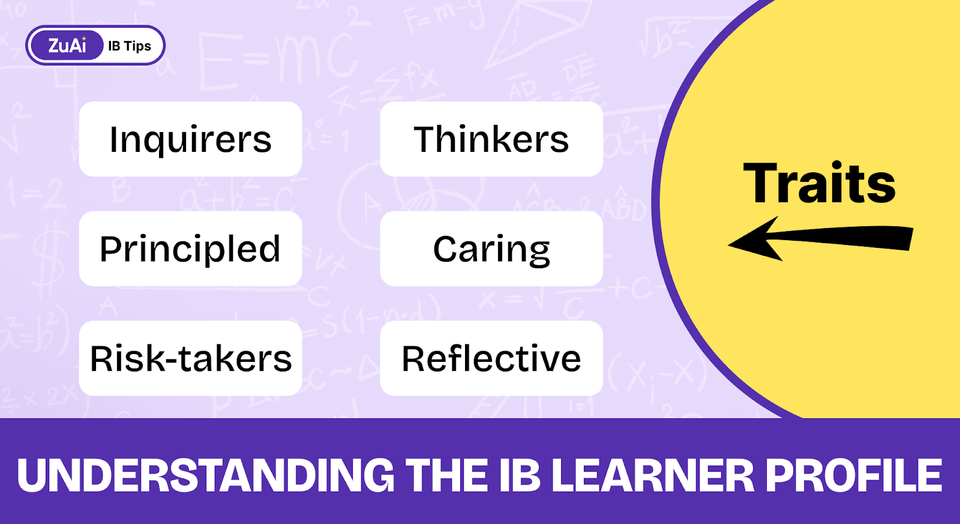IB Diploma Passing Criteria and Assessment Requirements

The moment you decide to become an IB student or even think about becoming one, you’ve probably wondered, “How many points do I need to pass to get my diploma?” Well, that’s a valid question and a good point because your curious brain has started questioning and exploring and that’s too at the right place! The IB Diploma Programme (DP) is all about challenging yourself academically, pushing your limits, and preparing for the future. However, with its rigorous assessment criteria and point system, it can sometimes feel a bit overwhelming.
Don’t worry, we have got you covered. In this guide, you will learn everything you need to know about IB passing criteria, the point system, and what it really takes to earn that converted diploma. You’ll also discover strategies to stay on track, avoid common pitfalls, and make the most of your IB experience. Whether you're a few months into the program or gearing up for final assessments, this post will give you a clear, easy-to-understand breakdown of exactly what you need to succeed.
Overview of the IB Diploma Programme
The IB Diploma Programme consists of six subject groups and three core components.
From the six subject groups, you must choose one subject from each group, with the option to select an additional subject if you prefer. Out of these six subjects, you’ll need to take at least three at the Higher Level, while the others can be studied at the Standard Level. This approach balances your workload while allowing you to focus more on the subjects you’re passionate about or stronger in.
Also Read: Complete Guide to Writing an Outstanding IB Extended Essay (EE) for N24 and M25
Furthermore, these six subjects are categorized in two different ways. Let’s go through them.
Categorization Of Subjects - Higher Level (HL) and Standard Level (SL)
In the IB Diploma programme, the six subjects are divided into two categories based on their intercity and depth - Higher Level (HL), and Standard Level (SL).
Basics check! Let’s move further into the world of IB Assessments.
How Many IB Points Do You Need To Get The Diploma?
When it comes to the IB Diploma, it’s important to have a deep understanding of how your work is assessed. This understanding will help you to prepare well, and stay stress-free. Let’s break it down, so you know exactly what to expect from each subject and how your scores are evaluated.
To earn the IB Diploma, you need to get a minimum score of 24 points. However, the task doesn’t just end at meeting that number. Other than these 24 points, you also need to complete core components like the Theory Of Knowledge (TOK) course, an Extended Essay (EE), and the Creativity, Activity and Service (CAS) requirements.
While the core components of the IB Diploma may seem like additional tasks, they are essential to your success in the program. Failing to complete or meet the requirements in areas like Theory of Knowledge (TOK), the Extended Essay (EE), and Creativity, Activity, and Service (CAS) can make you ineligible for the diploma—even if you score enough points overall. It’s crucial to meet the required standards in these components to ensure you earn your IB Diploma.
Need guidance through your study hours? Meet ZuAI’s 24/7 Smart Buddy, your complete study partner.
Breakdown Of IB Scoring System
The IB scoring system might look tricky at first, but once you get the hang of it, you’ll feel more confident about where to stand.
Scoring System - 1 to 7 For Each Subject
For every subject you take in the IB program—whether it's Math, English, Science, or something else—you’ll receive a final grade between 1 and 7.
A 7 is the highest score you can earn, and it means you’ve mastered the subject. A 1 means you’ve got some serious work to do.
So, what is the maximum score you can earn? Here’s how it breaks down: you can earn up to 7 points for each of your 6 subjects. So, 6 subjects multiplied by 7 points equals a total of 42 points. Therefore, the highest possible score is 42 points
Also Read: Understanding the IB Grading Scale 1-7
Tip: Try setting mini-goals for yourself. Aim for at least a 5 or 6 in each subject to keep your overall score healthy.
TOK and EE: The Bonus Points
The IB program isn’t just about traditional subjects. You’ll also need to complete two unique components: Theory of Knowledge (TOK) and the Extended Essay (EE).
- TOK - It is all about critical thinking skills and questioning how you know what you know. It's designed to push you to explore different perspectives and challenge assumptions, encouraging deeper thought about the world around you. You’ll have to write essays and give presentations to show your understanding.
- Extended Essay - The EE is a 4,000-word research paper that you will write on a topic that interests you. You'll choose a subject you are passionate about, conduct thorough research, and present your own findings and insights.
Both TOK and EE are graded from A (highest) to E (lowest). Doing well in these two components is essential because they can add up to 3 bonus points to your final IB score. Look at this picture for a reference:
- If you score an A in both TOK and the EE, you get the full 3 bonus points.
- A combination of lower grades, like a B and C, could still earn you 1 or 2 bonus points.
The highest possible total score in the IB Diploma is 45 points.
The Six Subjects of IB Diploma is graded on a 7-1 scale. 7 being the highest and 1 being the lowest. The description of the marking is as follows:
The Core Components - TOK and Extended Essay are graded on a A - E scale. It can also be marked as “Not Submitted”, in case you are unable to submit them in a given timeframe. The combined grade of Extended Essay and TOK will be calculated and that would be your final score. Refer to this table to understand the framework of combined calculation of the grades.
Description of Core Components Grades - A To E
A - Work of an excellent standard
B - Work of a good standard
C - Work on a satisfactory standard
D - Work on a mediocre standard
E - Work on a elementary standard
Tip: For both TOK and the EE, choose topics that interest you. This makes the research and writing process easier and more enjoyable
Subject Assessments - Internal Assessments and External Assessments
Your final grade in each subject isn’t just based on one big exam at the end of the year. It's based on the two types of assessments - Internal Assessments (IAs) and External Assessments (EAs).
- Internal Assessments (IAs) - Show Your Skills
Your Internal Assessments (IAs) are the projects, lab reports, essays, and even oral exams of your subjects. These tasks are marked by your teachers but later assessed by IB examiners. Your IAs contribute 20-25% to your final score in each subject.
This is good news because IAs give you some control over your grade before the final exams roll around. This control allows you to show your understanding of a subject in a more creative and less time-pressured way than an exam.
Tip: Treat Internal Assessments smartly. They can seriously improve your grade, and they give you a chance to shine in ways that exams might not.
- External Assessments (EAs) - Final Exams
Your External exams (EAs) are the final exams, which happen at the end of your IB Programme. These exams are marked and assessed by IB examiners. External Assessments generally carry the majority of weight in determining your final grade for each subject. The exact weight can vary depending on the subject, but typically, External Assessments account for around 70-80% of your total grade in most subjects.
Conditions For Awarding The Diploma
Is scoring 24 points all you need to earn an IB Diploma? Not quite. While 24 points is the minimum requirement, there are additional criteria to meet. The IB Diploma Programme emphasizes holistic development, which is why it includes components beyond academics. In addition to achieving the required points, you must also fulfill specific non-academic conditions to obtain your diploma.
Numeric Grades In All Six Subjects
Ensure that you complete all topics in each of the six subjects to receive a numeric grade (ranging from 1 to 7) for each one. Incomplete work or skipping topics leads to no score. Remember, every effort you make counts towards your success.
Complete The CAS Requirements
CAS – Creativity, Activity, and Service serves you an opportunity to explore and engage beyond your academics. Within the IB Diploma Programme, you are required to dedicate a certain number of hours to CAS-related activities. These can include anything from playing a sport to volunteering in your community. While CAS itself isn’t graded, fulfilling its requirements is essential; failing to do so will prevent you from receiving your diploma.
Earn At least D in Grade in TOk and EE
In TOK and EE grading, E is considered as a “Failing Condition” which leads to disqualification. Strive for scoring high in the core components, or at least score the minimum D to earn 3 bonus points and avoid disqualification.
No Grade Of 1 In Any Subject
This is a big one - you cannot receive 1 in any subject. Receiving a score of 1 will make you ineligible for the IB Diploma, even if your total points exceed 24.
Limits on Low Grades (2s and 3s)
The IB also sets limits on how many low grades you can get:
- You cannot have more than two grades of 2 across your subjects.
- You also need at least 12 points from your Higher Level (HL) subjects and 9 points from your Standard Level (SL) subjects.
Tip: Track your scores as you go through the program. Knowing where you stand will help you stay motivated and avoid any surprises at the end.
What Happens If You Don’t Succeed In Your 1st Attempt?
It is okay if things don’t go as planned. But patience and perseverance are the key to moving on. Failing to meet the diploma requirements on your first attempt isn’t the end of the world. You can always retake your exams or complete any missing components. The IB gives you up to two additional sessions to improve your scores, so you have a chance to make things right.
To make your preparation more engaging, explore ZuAI’s Mock Exam Papers, complete with logical explanations of key concepts
How Are IB Exams Graded?
Ever wonder how your exams are graded? Here’s the scoop:
Predicted Grades
Your teachers will give you predicted grades based on your performance throughout the course. Based on your Internal assessments (IA’s) score they guess on how you’ll perform in the final exams. Sometimes, your predicted grades are shared with universities during the application process, so doing well throughout the year can give you a competitive edge.
Final Grades
The IB examiners will grade your External Assessments (EAs), while your Internal Assessments (IAs) are marked by your teachers and moderated by IB. It’s important to note that your final IB grades might differ from your school report card grades since the IB has its own standards and evaluation criteria.
Tips to Score Higher in IB
Studying can be challenging, but the effort you put in makes the rewards even sweeter. After a long night of preparation, there’s nothing quite like the thrill of achieving a high score. Here are some strategies which you can follow to achieve the desired results:
1. Mindful Time Management
Balancing six subjects, TOK, EE, and CAS can feel like a lot, but time management is your best friend. Use planners or apps to keep track of deadlines and prioritize your tasks. ZuAi offers a variety of tools such as AI based “Timetable Generator” that can help you greatly to manage your schedule.
2. Focus on IAs
Since Internal Assessments (IAs) count toward your final grade, start early and aim for quality. These projects give you a chance to explore topics you’re passionate about and can seriously boost your score.
3. Stay Consistent
Instead of cramming for exams, create a consistent study schedule throughout the year. This way, you’ll avoid last-minute stress and retain information better.
4. Collaborate with Study Buddies
Study groups can be a great way to tackle difficult subjects. Sharing ideas with classmates helps clarify confusing topics and keeps you motivated. Even ZuAI's Smart Buddies, like the IB Expert Coach, 24/7 Smart Buddy, and Literary Bot, are here to support you every step of the way.
5. Practice IB Past Papers
One of the most effective ways to prepare for IB exams is by practicing past exam papers. These give you a real feel for the types of questions you’ll face and help improve your exam technique. Click here to navigate the ZuAI vast question bank to make your preparation a fun and engaging activity.
Also Read: Understanding the IB Score Out of 45: A Complete Guide
What Happens After the IB Diploma?
Earning the IB Diploma opens doors to universities worldwide. The IB’s reputation for academic rigor gives you an edge, and some universities even offer advanced placement or credits for high IB scores.
Bonus Tip: Check the IB credit policies of the universities you’re interested in. Some schools offer up to 30 credits based on your IB results, allowing you to skip certain introductory courses and potentially save time and money.
Wrapping Up!
Earning your IB Diploma isn’t just about passing—it’s about thriving and preparing for a bright future. Understanding the assessment system and staying on top of your work will set you up for success. Your scores don’t define your potential, but they do reflect your commitment and determination. The right strategy, solid preparation, and a focused mindset are the formula for acing your IB Diploma journey.
ZuAI is here to kickstart your winning streak in your academic journey. With AI Smart Buddy by your side 24/7, you’ll get complete assistance and guidance on any tricky topics. Now is your chance to make the most of mock tests and question banks to excel in your assessment preparation.
Sign up with ZuAI and discover how we can support you on this exciting path!


